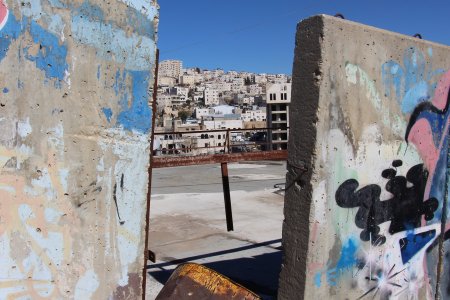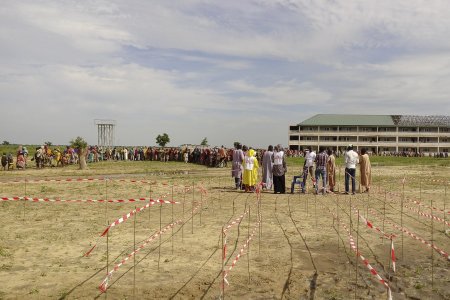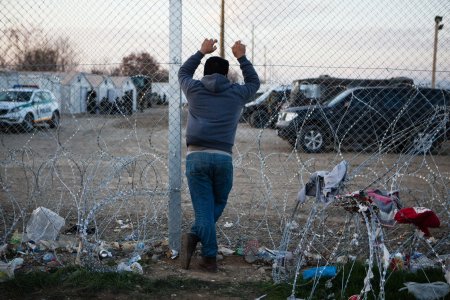
From bureaucratic inertia to “policy fragility”
Jean-Hervé Bradol
Interview by Helai Hosseini. A first version was published on the website of the MSF France association on 31 July 2020.
In the wake of the Black Lives Matter movement in the United States, voices have risen within MSF denouncing the racist and discriminatory nature of our organization. Equal opportunity, they say, is not offered to all our employees. Founded in France in the early 70s by a handful of doctors and journalists, the organization has grown and become international, now employing over 46,000 people around the world, nearly 39,000 of whom are recruited locally. How has MSF’s policy towards its personnel evolved down the years? What is currently being done to fight inequalities? Here is Jean Hervé Bradol’s take on the major phases that have marked MSF’s transformation and the ways in which discussions are engaged today.
What changes have you observed in the way different categories of personnel are treated in MSF?
At first and for a long time, the relationship with the national staff came through the hiring of their services: cooks, housekeepers, translators, technical advisors in support of the expat logistics operator, drivers, gardeners, etc. The locally recruited workers were seen as simple employees and by no means as members of MSF. Having said that, we immediately have to stress the huge diversity of situations in the field relating to domestic tasks. Managing daily life in a big Asian city is a far cry from managing it in the sub-Saharan countryside, altering the relationships between people living in any given country.
For the first volunteers, MSF was initially a Parisian association. The first internal tensions arose around a dividing line of "Paris versus the province". Then, among the international staffOr expats, as international staff was referred to at the time., doctors held all the positions of power both in the field and at headquarters. It was the first socio-professional category of discrimination that we had to probe. Of course, in such a situation there is also the reproduction of inequalities in relation to gender and class. Within the medical profession, women were not in the minority, as they already held decision-making positions in programs and operations; but this does not mean that gender inequalities received the attention they deserved. The main issue occurred in the care implemented in the field. For example, no specific protocol for the victims of sexual violence was put in place prior to the early 2000s.
Then, the non-French-speaking expats – who were growing in numbers because of the Europeanizing and internationalizing of the MSF movement – complained of being excluded by their French-speaking colleagues. Ironically, mastering the English language has today become in itself a vector of inequality.
In the late 80s and early 90s European and American public funds enabled us to begin employing care-providers locally. These colleagues played a direct role in running our local missions, but we were still in the service-provider mode, and we did not feel responsible for the situation beyond the employer-employee relationship. In 1993-1994, we expatriated national staff colleagues for the first time by sending a Madagascan team to Rwanda, where we had to start up huge aid operations as the health situation in the country was calamitous for the displaced and refugee populations. One of the female doctors in this team became the country’s medical coordinator.
But that dynamic didn’t last. It highlights to what degree an evolving institution tries to catch up with the reality of practices. By the early 1990s the conditions were there for expatriating members of the national staff, but it took another dozen or so years before it became a more common practice. At the same time another problem asserted itself, i.e. the need to improve the national staff’s security conditions, an important and very substantial topic in day-to-day Rwanda where the Tutsis were threatened with extermination.
2002 was a watershed year. The issue of membership in the organization of national staff members was put on the table at an MSF-France Board of Directors meeting when I was president. A look at the statutes showed that there was nothing against it. So we confirmed that the association was open in general and in particular to national staff, which was an important starting point for what followed.
In that same year we were faced with a scandal in the refugee and displaced-person camps in West Africa, where the leaders of local NGOs and United Nations workers demanded sexual favors in exchange for food and care. Such practices were far from peripheral, and we had to reflect on the abusive practices that some of our national staff members might exercise, certain “big men” in aid on a local level, to use the term from back then. It was also apparent that members of the international staff were turning a blind eye to these serious acts.
2002 was also marked by a huge malaria outbreak in Burundi, where patients were given ineffective medicines without its posing many problems [of conscience] for MSF or the aid world generally. Yet several of us at MSF were shocked by a situation that would have been otherwise unthinkable anywhere else than in a poor, small sub-Saharan African country. It should be noted that this kind of phenomenon is not rare, particularly in Africa. I’m talking about accepting degraded medical practices in complete contradiction to both scientific and ethical recommendations. For example, in the context of the Ebola treatment centers in West Africa (2013–2016), patients who couldn’t be rehydrated orally were not, in most cases, rehydrated via bone marrow or intravenously. Despite protests by numerous field doctors and a small number of directors, the MSF institution justified such deterioration in care (a practice presented as futile and dangerous) and threatened those who opposed it with sanctions.
What’s your analysis of these abuses of power in West Africa and this discrimination leading to the poor treatment of patients in Burundi?
We must stop thinking that humanitarian actors are or should be a moral elite. Humanitarian practices reproduce inequalities and abuses that are found in our own societies. That is fostered by the fact that aid beneficiaries are by definition in a weak position, where it is hard for them to defend their rights. There is a link between the abuse suffered by staff and the abuse suffered by the recipients of aid. The quality of care provided depends on the quality of the staff providing it. People mistreated by their employer will mistreat their patients. The quality of a care service depends on the quality of the staff’s work, which in turn depends on the quality of the treatment received by the staff.
What about the disparities in treatment of MSF’s national and international staff?
Up until the 2000s, with very few exceptions, national staff members were not allowed to apply for jobs abroad, without us really knowing why, as there was nothing in the statutes or internal regulations to prevent them from doing so. It first occurred through bureaucratic inertia, i.e. force of habit inherited from a time when national staff members only carried out domestic or logistic duties but nothing medical.
Moreover, prejudices helped justify the situation. National staff members were depicted as wanting to expatriate for venal reasons, even though the desire to enjoy decent living conditions through one’s salary is legitimate and not down to a staff category.
The other very negative aspect of our internal organization for carrying out quality work was the fact that national staff members could not fill decision-making jobs in their countries of residence. They were excluded from meetings where important decisions were made. Other than their alleged venality, there was a wide-spread prejudice that they couldn’t behave impartially in their own country if it was torn by conflict.
When the Board tried to remedy all these issues, it ran up against some heads of mission, operational officers and human resource officers. One of the first cases we decided to deal with pertained to daily workers. The pay given by MSF in some African countries enabled them to feed their families but not send their kids to school. This level of pay was already higher than that currently practiced in their societies. Should we have accepted such a situation?
We worked along with the heads of human resources who understood what was at stake for the quality of aid offered by our organization, in order to widen a kind of common rights. This meant taking this principle as a starting point, so as to see if the differing treatments that were introduced afterwards could be justified by specific skills for carrying out the social mission – being a surgeon, for example – or by insurmountable outside constraints, e.g. holding an Israeli passport to enter Iran. To gauge our progress, we began trying to measure how many national staff colleagues expatriated each year. A crisis in recruiting skilled medical workers enabled many national staff members to access these positions. Likewise, in 2005 in Niger it was thanks to expatriate African staff members and national medical officers that we were able to tackle the food emergency. Precedents were set with these crises, which eventually became common practice with the help of proactive policies. We also turned our attention to the mix – national with international – of our coordination teams. In short we tried to clamber up the whole chain where unjustifiable inequalities occurred, at least in our eyes.
What according to you are the obstacles to national staff mobility?
When I joined MSF in the late 80s, field teams were almost exclusively composed of French nationals. Today in the Paris office, as in the international personnel, we have colleagues from many different origins, even if it is still problematic on the directors’ level and in the composition of the Board.
In this discussion, it is helpful to remember that we began as an association under French law, which then began to Europeanize at first and now aspires to become global. All that in a few decades, and with no international legal associative framework. This helps to better understand why the organization is always lagging behind real practices and the wishes of its members.
It is often material aspects that cause problems. It can be hard for a foreign colleague and even sometimes for a French colleague from the provinces to move to Paris for a short spell, with no clear view of the next steps in their professional careers. If the organization demands international mobility, it has to support its employees administratively and financially to enable them to settle in, as we do when we send a French colleague to New York or expats with their families to the other side of the world, even if it means incurring additional expense. In this sense, we have to create a common-rights policy.
Otherwise, pertaining to expatriation, we still have a tendency to “sanctify” the expat’s impartiality in conflict situations and assume they will be able to carry out their mission by obeying humanitarian principles. It is true in some situations, but it is absurd to promulgate general rules that lead to the exclusion of national staff members from certain jobs and hinder their advancement within the organization.
I think that today’s leaders, along with WACA – an MSF association and a West-African-based operational center – have a project that is a profound renewal of our ambitions.
How, according to you, can inequalities be remedied in MSF?
In three verbs: democratize, professionalize and prioritize!
It’s first of all a matter of furthering internal democracy. As much as it has progressed at the national level - we have had section presidencies held by former national staff, although much remains to be done - it has regressed at the international level where members of national associations do not have the right to vote. It’s fairly complicated on the legal plane, but we have to end this system of grand electors – as suggested by our General Director – as soon as possible; as it embeds an old-boys’ caste of notables in humanitarianism without borders.
But greater democracy isn’t enough. We also have to “professionalize” the fight against inequalities and abuses of power. There should be a management position dedicated to this area. The starting point of inequality is often bureaucratic. No one wants, for example, the International Remuneration Project, version 2 (IRP-2), to harm African staff members. Yet in the end it is a major stain with racist undertones in how work is organized and the in the treatment of our staff. With the IRP-2, a French expatriate doctor and a Sudanese expatriate doctor both working in Kenya do not have the same salary even though they do the same work. As most of our national staff is from Africa, it is systematically these colleagues who are paid less when they are expatriated.
This of course produces a detestable system, whatever the motives may have been in the first place. The French section of MSF abandoned this practice several years ago but it had already wreaked havoc.
Note in passing – since it is one of themes of our internal debate – that this kind of discrimination is indeed systemic. It should also be noted that at the origin of this unequal system is an intention of equity: to pay international staff members according to the different standards of living in the societies from which they come. This contradicts an idea that is obvious to the vast majority of our colleagues: "equal pay for equal work".
Whether they are enshrined in our rules or derived from custom, the exceptions have to be deconstructed in favor of common policies to eradicate an injustice. Most of the time, it is enough to eradicate an unjustifiable exception which requires close attention every day to weed out what is not justifiable. As soon as an organization reaches a certain size, it has to institutionalize and professionalize the fight against arbitrariness. It is one of the traits of human societies to constantly renew the forms of discrimination. It's an endless task. Thinking of eradicating all injustices is a dangerous illusion that leads to the development of authoritarian, ineffective and unjust practices.
Priorities must be set in this endless struggle. We should be guided by two ideas in this exercise, i.e. identifying the staff members and patients who are the most exposed to unfair treatment and, secondly, identifying the injustices that have the greatest impact on the quality of work. From a historical and geographical standpoint, it is sub-Saharan Africa that immediately draws attention by the severity of the inequalities we detect. It is also telling that the descendants of Africans are, outside of the continent, also hit by deep-running injustices. It is no coincidence that our discussion has begun with the murder of George Floyd. The conditions of Afro-Americans remain appalling, especially those of the blue-collar working class.
The discussion of racism and inequality in MSF follows on the Black Lives Matter movement in the United States. Can the American situation be transposed to all of MSF?
I think is entirely fair that MSF-USA has thrown its weight behind the Black Lives Matter movement. I would add that as a former member of the MSF-USA Board (2000–2008), I am proud of it.
But I don’t think it relevant for the directors of MSF, whether in America or elsewhere, to accept the concepts or the analytical table of certain currents of leftwing thinking that are intolerant to other people’s positions. I am thinking here of ideas such as: MSF - a racist institution; white fragility; white privilege; white supremacy; an organisation that is necessarily racist when its anti-racism is not defined by this fraction of the left, etc.
The issue is not specifically American. These political currents are expressed on a worldwide scale. The most intolerant warn their various listeners to adopt their opinions or else be subjected to a public campaign of moral denunciation. Academics, journalists and art and philanthropic professionals have lost their jobs under the pressure of such smear campaigns. Under the guise of fighting genuine injustices (racism, sexism, infringement of human rights, police violence, inequalities in access to medical treatment, etc.) and of mobilizing against severe damage to the environment, democratic discussion is no longer tolerated. It’s the regime of “with us or against us”. What I am suggesting here is not to tolerate racism but to preserve the possibility of discussing the shapes it assumes in today’s world and within MSF itself. Even having to mention this point shows the extent to which the atmosphere of the discussions has been poisoned.
To those who could think I could be exaggerating, I’d highly recommend you watch this short propaganda video : Racism at Doctors without Borders
On this issue of discrimination as on those of access to medicines and managerial roles – themes addressed at the CRASH – we know that it is essential to understand the barriers. Implementing a policy that contributes to improving humanitarian action has to be preceded by serious analytical work and not propounding an ideology closed to discussion, as if this discussion could only be a debate expressed in the following terms: “Are you for or against racism?”!
At the end of June 2020, an open letter denouncing "empty declarations, the absence of a real acknowledgement of failure and the lack of evidence of a commitment to concrete action" to fight "the racism perpetuated within MSF" was sent to the leaders of MSF.The open letter first appeared internally and was then the subject of an article published in The Guardian, with other newspapers and publications subsequently publishing the story. What do you think of this internal petition?
With over 1,000 signatures and 170 comments, this letter opens a needed discussion and inspires an important associative moment. The problem is that its authors are closing the discussion before even having it. If all institutions – including MSF – are racist, then none really are. To my mind, generalizing the accusation and its essentialist dimension – that “whites” are suspect by nature “since racism gives them advantages” – weakens an anti-racist mobilization that is nonetheless vital.
From a political point of view, we are seeing a big return to the anti-democratic component of the left. Thirty years after its historic defeat at the end of the cold war, this return seems inevitable to me. In our ranks it takes the shape of a sort of “humanitarian Stalinism”. I think that the leaders of our international movement are letting themselves be intimidated a little too easily, thereby showing their “political fragility”, even a kind of “jumping on the bandwagon”.
It is one of the fundamental characteristics of humanitarianism not to require ideological pre-requisites from its members for them to act together to care for and rescue people threatened by death. It is what happens every day in our operations where colleagues who, in another context, would never even speak to one another, work together to achieve our social mission. By their mind-set, they show us that tolerance is a condition of humanitarian action.
To cite this content :
Jean-Hervé Bradol, “From bureaucratic inertia to “policy fragility””, 8 septembre 2020, URL : https://msf-crash.org/en/humanitarian-actors-and-practices/bureaucratic-inertia-policy-fragility
If you would like to comment on this article, you can find us on social media or contact us here:
Contribute



